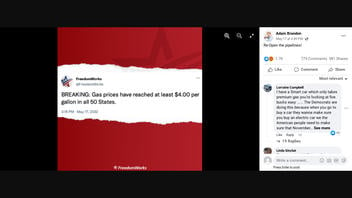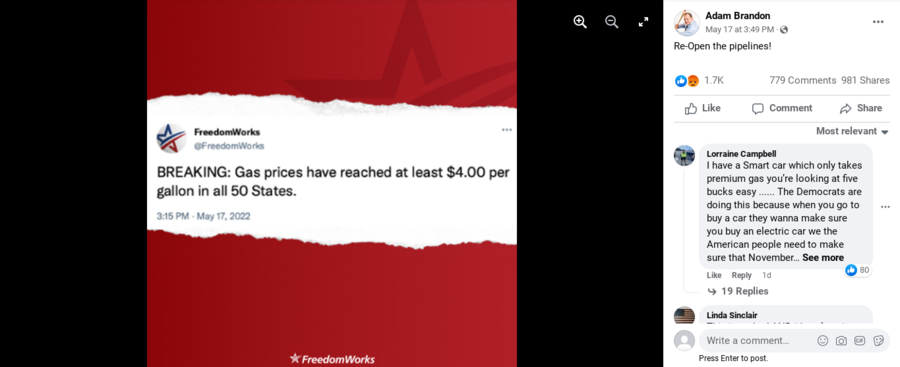STORY UPDATED: check for updates below.

Are high U.S. gas prices in 2022 related to closed pipelines? No, that's not true: The high gas prices in 2022 are mostly attributed to the price of crude oil, along with global economics and world affairs. There is no evidence that closed pipelines have dramatically affected gas prices in 2022. Although President Joe Biden blocked the rest of the construction of the Keystone XL Pipeline in January 2021, the pipeline's effect on gas prices is unknown, considering it was never completed.
The claim appeared in a Facebook post on May 17, 2022. The post included a screenshot of a tweet supposedly posted on May 17, 2022, that stated "BREAKING: Gas prices have reached at least $4.00 per gallon in all 50 states." The caption of the Facebook post reads:
Re-Open the pipelines!
This is what the post looked like on Facebook at the time of writing:
(Source: Facebook screenshot taken on Thu May 19 15:18:33 2022 UTC)
According to data from the American Automobile Association, average regular gas prices in all 50 states were $4.00 or higher on May 17, 2022. However, those prices did not appear to be affected by pipeline closures. In an email sent to Lead Stories on May 19, 2022, the Energy Information Administration (EIA) told us the claim was "a little too non-specific for us to address directly," but included a gas prices explainer stating that high gas prices are primarily caused by the prices of crude oil. The EIA's explainer says that other components of gas prices include federal and state taxes, distribution and marketing, and refining costs and profit.
According to the EIA explainer, factors affecting oil prices include Russia's 2022 invasion of Ukraine and a greater demand for petroleum following the easing of COVID-19 pandemic restrictions.
Lead Stories could not find any evidence that closed pipelines have greatly affected gas prices in 2022. We reached out to the Federal Energy Regulatory Commission and the Pipeline Association for Public Awareness, whose respective spokespeople said that the claim was out of their respective organizations' missions. We also contacted the Department of Transportation but were referred to the EIA.
In a separate email sent on May 19, 2022, the EIA referred us to its "U.S. Liquids Pipeline Project," a list of publicly available information about liquids pipelines that started from 2010, onward. However, the EIA told us that the list is "potentially not an exhaustive list." We used the search function on the list's page named "Pipeline_projects" and looked for the words "close," "shut down" and "reopen," with no results of any pipelines that were closed at the time of writing. Several pipeline projects were classified as "Canceled" over the years. But according to the list's page named "Definitions," the classification "Canceled" does not mean that an operating pipeline was closed.
Lead Stories also searched for "closed pipelines," "reopen pipelines" and "gas prices pipelines" online and did not find any results establishing a credible relationship between pipelines that are closed and high gas prices in 2022.
Several news organizations have debunked the claim that the cancellation of the construction of the Keystone XL Pipeline, which was designed to transport crude oil from Canada to the U.S., resulted in increased gas prices (see here and here). But because the pipeline was never completed, its impact on gas prices cannot totally be determined. In its first email to Lead Stories, the EIA said of the Keystone XL Pipeline:
... we never ran a model analyzing what effect it would have had on domestic gasoline prices. So it would be difficult to comment.
In an email sent to Lead Stories on May 20, 2022, a Department of State spokesperson told Lead Stories that the Keystone XL Pipeline is totally unrelated to high gas prices:
The Keystone XL pipeline was not an oil field, it was a proposed pipeline that if permitted, would still be years away from completion. And the sources of oil that would have flowed through it are still flowing. So the Keystone XL decision has absolutely NOTHING to do with the current supply imbalance.
Lead Stories also reached out to the American Petroleum Institute and will update this story with any relevant response.
Updates:
-
2022-05-27T23:14:47Z 2022-05-27T23:14:47Z Added response from Department of State spokesperson.



















